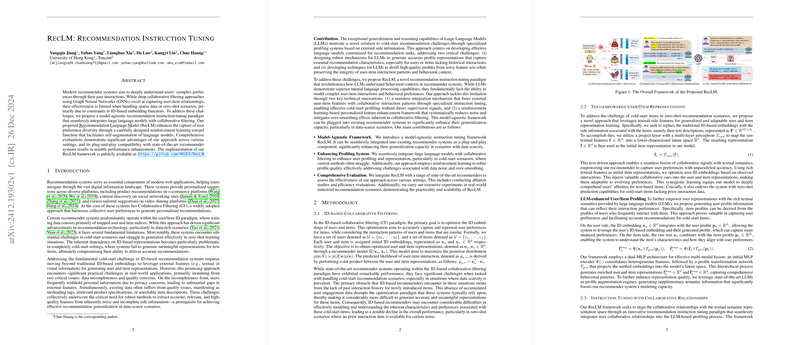Overview of "RecLM: Recommendation Instruction Tuning"
The paper "RecLM: Recommendation Instruction Tuning" presents RecLM, a novel model-agnostic framework aiming to enhance recommendation systems by integrating LLMs with traditional collaborative filtering techniques. This work specifically targets challenges such as handling sparse data and zero-shot scenarios, which are common obstacles for current recommender systems that primarily rely on ID-based embeddings.
Methodological Innovations
The proposed framework, RecLM, stands out due to its innovative use of instruction tuning and reinforcement learning to improve the performance of LLMs in recommendation tasks. RecLM introduces two key enhancements:
- Instruction Tuning Integration: This method fuses external user-item features with collaborative patterns through instruction tuning. By leveraging advanced LLMs like Llama2-7b-chat, the framework fine-tunes these models using a collaborative instruction tuning paradigm. This approach incorporates higher-order relationships, thereby enhancing the LLM's understanding of complex user-item interactions beyond simple ID-based relationships.
- Reinforcement Learning Enhancement: The framework employs a reinforcement learning-based enhancement mechanism that targets noise reduction and mitigates over-smoothing effects, which are typical in collaborative filtering. This involves a two-phase fine-tuning process that generates high-quality profiles by aligning collaborative and semantic spaces.
Empirical Evaluation
The empirical evaluation provided in the paper demonstrates significant performance improvements when RecLM is integrated with state-of-the-art recommendation systems such as LightGCN, SGL, and SimGCL. Specifically, RecLM exhibits substantial enhancements in recommendation tasks under both full-shot and zero-shot settings across datasets like MIND, Netflix, and a large-scale industrial dataset. This confirms the framework's practical efficacy in addressing cold-start challenges and improving generalization capabilities.
- Zero-Shot Recommendation: The paradigm shows notable performance boosts in zero-shot scenarios, particularly illustrating its ability to handle cases where new items have no prior interaction data. Such robust handling of cold-start situations addresses one of the core limitations of ID-based recommenders.
- Plug-and-Play Compatibility: RecLM offers plug-and-play compatibility with various existing collaborative filtering models, highlighting its versatility and easy integration into current recommender systems without extensive modifications.
Theoretical and Practical Implications
Theoretically, RecLM contributes to bridging the gap between natural language processing and recommendation systems by effectively synthesizing the strengths of LLMs and collaborative filtering. Practically, its applicability to large-scale, real-world datasets and scenarios showcases its potential for immediate deployment and benefit in industrial applications.
Future Directions
The authors suggest exploring the extension of RecLM to multi-modal environments where user interactions encompass diverse data types, such as images and videos. Additionally, they propose investigating lighter LLMs to enhance efficiency, aiming for reduced computational demands while retaining high-quality profile generation.
In conclusion, RecLM presents a sophisticated approach to recommendation instruction-tuning, addressing longstanding issues in cold-start and generalization within recommender systems. Its integration into contemporary models exemplifies a significant step forward in leveraging LLMs to enhance the semantic richness and adaptability of recommendation frameworks.
